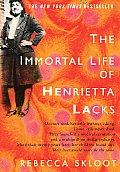It has been three years since Rebecca Skloot's The Immortal Life of Henrietta Lacks hit bookstore shelves and became an immediate "must-read" for so many of us. The bestselling book went on to garner multiple awards, critical praise and has been a reading group staple nationwide.  More importantly, Skloot's work trained long-delayed focus on the amazing legacy of an African-American tobacco sharecropper's daughter, who had tumor cells removed without her consent by doctors in a Baltimore hospital shortly before her death at the age of 31 from cervical cancer in 1951. Billions of these HeLa cells have since been used in thousands of studies, yielding insights into cell biology, vaccines, in vitro fertilization and cancer.
More importantly, Skloot's work trained long-delayed focus on the amazing legacy of an African-American tobacco sharecropper's daughter, who had tumor cells removed without her consent by doctors in a Baltimore hospital shortly before her death at the age of 31 from cervical cancer in 1951. Billions of these HeLa cells have since been used in thousands of studies, yielding insights into cell biology, vaccines, in vitro fertilization and cancer.
Skloot also explored the predicament of Lacks's descendants, who had never been consulted about research decisions nor received financial compensation from the massive industry built on the foundation of their relative's cells.
Last week, however, the New York Times reported that the National Institutes of Health had "come to an agreement with the Lacks family to grant them some control over how Henrietta Lacks's genome is used." The deal "was prompted by two projects to sequence the genome of HeLa cells," the second of which was published in Nature.
On her Facebook page, Skloot shared the Times link and said she was "thrilled to post this breaking news--a truly historic moment." She also cited an interview with The Scientist about the meetings between the NIH and the Lacks family, stressing that "the opinions of the Lacks family, and not her own, were the most important determinant of the agreement's success."
A post on the Lacks Family Facebook page said they "look forward to working with N.I.H. and the scientific community to continue to advancement in science while still have a means of protecting our privacy."
As readers, we know how books can change lives, but this is an extraordinary instance in which a book has helped to change history. --Robert Gray, contributing editor

